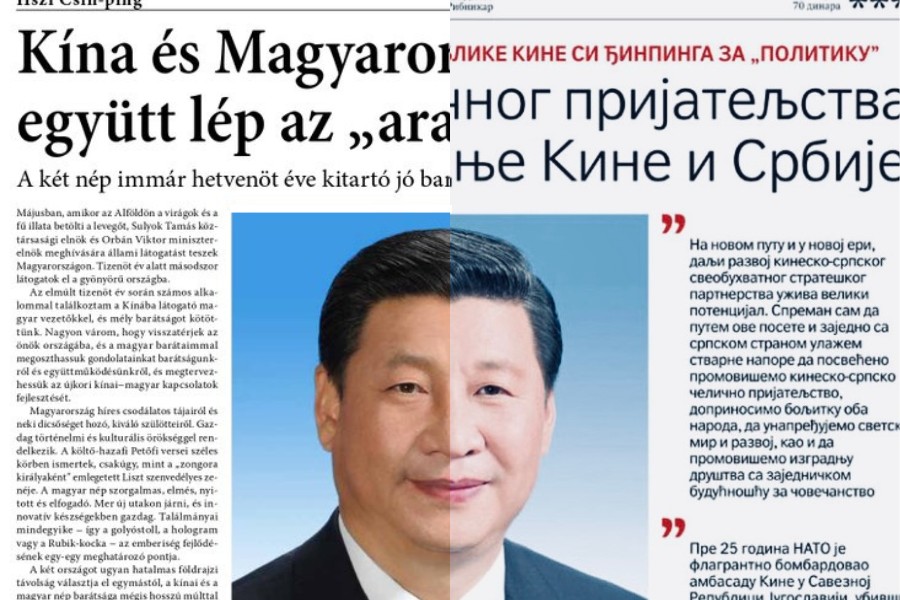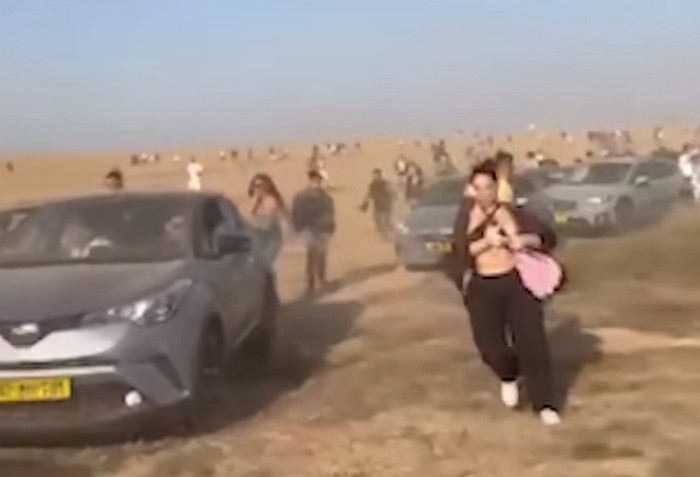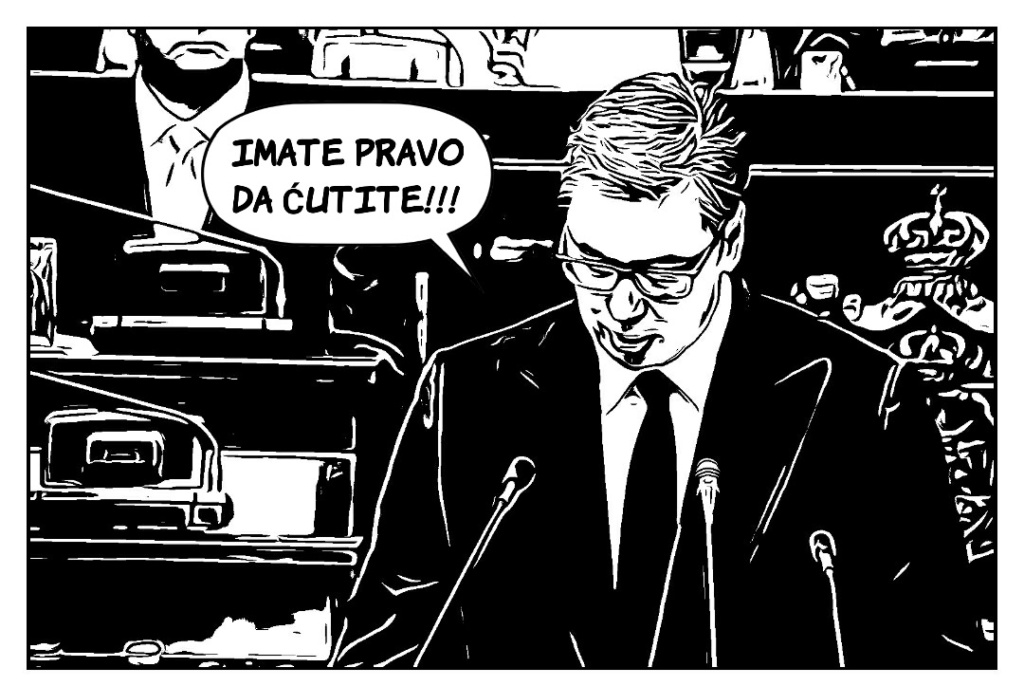“Today, first of all, I want to apologise to the citizens of Serbia, to the family of Mr. Curuvija, for the 14-year wait for those who, we suspect, committed the murder of Slavko Curuvija, to finally come to justice,” Serbia’s then deputy prime minister Aleksandar Vucic told a press conference in Belgrade on January 14, 2014.
The press conference was about the arrest of Milan Radonjic and Miroslav Kurak, who were being held on the suspicion that, as State Security operatives at the time, they participated in killing of well-known Serbian editor and publisher Slavko Curuvija in 1999.
Speaking before Vucic, the then chief prosecutor at the Prosecutor’s Office for Organised Crime, Miljko Radisavljevic, told the assembled journalists that the latest witness in the case was Milorad ‘Legija’ Ulemek, the notorious commander of State Security Service’s Special Operations Unit. Ulemek is serving a prison sentence for killing Serbian Prime Minister Zoran Djindjic in 2003 and for his participation in various other crimes during the 1990s.
“I have to point out that [Ulemek’s] testimony was unconditional, he neither asked for nor received any benefits, and he spoke very thoroughly and exhaustively about his knowledge of [the murder of Curuvija],” Radisavljevic said.
Curuvija was shot in front of his home in Belgrade on April 11, 1999 during the Kosovo war and the NATO bombing of Yugoslavia. The publisher of Dnevni Telegraf newspaper and Evropljanin news magazine, 49-year-old Curuvija was allegedly killed because of his outspoken criticism of authoritarian Yugoslav President Slobodan Milosevic.
Suspicion fell on State Security operatives loyal to Milosevic’s regime. Ulemek’s testimony seemed to offer hope that more light would be shed on the crime.
“I hope that something similar will never happen again, and it is my duty to say that it is completely clear that crimes and murders will never be able to go unpunished,” Vucic said at the 2014 press conference.
The murder of Curuvija did go unpunished, however.
Earlier this month, after a retrial in the murder case, the Court of Appeals in Belgrade announced it had cleared four Serbian State Security officers of involvement in the killing of Curuvija. As well as Radonjic and Romic, the court acquitted the former head of Serbian State Security, Radomir Markovic, and another man, Miroslav Kurak, who the court concluded was not a State Security employee at the time of the crime.
The final verdict in the trial, which was actually delivered by the judges in April 2023 but only made public on February 2 this year, angered media freedom campaigners who said it sent out a message that crimes against journalists are tolerated in Serbia.
An analysis of the verdict, obtained by BIRN, highlights the problems during the long legal process with establishing who actually shot Curuvija, and how star witness Ulemek’s testimony promised much more than it delivered. The verdict also highlights how the court accepted the Serbian authorities’ arguments for their use of surveillance against journalists.
Court decides surveillance ‘justified’
According to the indictment, Milan Radonjic, who was working as the chief officer at the State Security Centre Belgrade in the late 1990s, made a deal with Romic and Kurak to organise the assassination of Curuvija. Radonjic also used his official powers, illegally, without a court approval or a written proposal, to verbally order the tapping of Curuvija’s telephone.
The indictment also said Radonjic verbally ordered continuous physical surveillance of Curuvija on April 9 and 10, 1999 – the two days before the killing – and asked to be notified about the journalist’s every movement.
Since he was allegedly notified too late about Curuvija’s movements on April 10, Radonjic on April 11 demanded to be notified “promptly and in detail… about every change of movement and place where [Curuvija] is, especially when he goes to his apartment”.
The indictment alleged that Radonjic arranged for direct perpetrators to get this information, enabling them to kill the journalist outside his apartment.
The Court of Appeals’ verdict said that to examine the validity of this accusation, it was necessary to first look at “the question of whether there was State Security Service interest [in Curuvija] before [Radonjic became the service’s chief]”.
Based on official documents, the court established that Curuvija was “a subject of SDB [Serbian State Security] interest since 1994”, and that “as early as 1998, the TKTR [bugging telephone conversations] measure was applied to him”.
Stevan Basta, who was a senior State Security officer at the time, said during the Curuvija investigation in 2007 that since mid-1998, Curuvija was a person of interest for the service because of his coverage of the armed conflict in Kosovo, as were some other editors.
A security service analysis “concluded that [Dnevni] Telegraf does not provide information in a way that is close to the position of the state, and it was concluded that the activities of Slavko Curuvija should be more intensively monitored and handled”, the Court of Appeals verdict quoted Basta as saying.
In March 1998, Serbian police special forces attacked the Jashari family compound in Prekaz/Prekaze, a village in central Kosovo. Ostensibly, they were there to arrest Adem Jashari, one of the Kosovo Liberation Army guerrilla movement’s founders, who had been designated a terrorist by the Serbian authorities.
During the two-day operation, Jashari and 58 of his relatives were killed. Their deaths are credited with boosting public support among Kosovo Albanians for the Kosovo Liberation Army’s armed struggle, effectively starting the Kosovo war.
Curuvija and other editors-in-chief were summoned to the police on March 9, 1998 after reporting on the Jashari incident.
Branka Prpa, Curuvija’s partner, told BIRN in 2021 that during his interview with the police, “he stated in writing why he used the term ‘Albanians’ [for the Jashari family] and not ‘terrorists’, writing that he could not call women and children terrorists”.
Meanwhile, State Security was tapping two of his landlines, one at his apartment and the other in his newsroom.
Radonjic’s predecessor as chief of the State Security Centre Belgrade, Momir Radosavljevic, told prosecutors in 2007 that for the service, it was “interesting that [Curuvija] was going on a trip to America and it was interesting to discover the origin of the money to finance his magazine and whether he has contacts with persons of intelligence interest in Belgrade”. Radosavljevic said all this mean the service interest in Curuvija was “justified”.
In United States in December 1998, Curuvija spoke before the US Congress’s Helsinki Commission, which deals with security and cooperation in Europe.
“A month ago, I was a successful publisher and owner of two influential and popular publications, daily newspaper Dnevni Telegraf and news magazine Evropljanin,” Curuvija said.
“Mr. Chairman, I stand before you today as a man whose company has been ruined, whose publishing house assets have been seized and whose publications have been banned by Slobodan Milosevic’s regime,” he added.
Curuvija was speaking after the Serbian government imposed a decree and then a law in autumn 1998 that enabled it to ban newspapers, confiscate their equipment and fine and jail journalists. This enabled the state to heavily fine Curuvija’s newspapers and seize their equipment.
However, the Court of Appeals found that “no cause-and-effect relationship has been proven” between Radonjic’s order for surveillance and the assassination of Curuvija. It added that Radonjic was not indicted for abusing his powers, but for involvement in a murder.
The court also found that the essence of Radonjic’s defence – that “the measures he ordered were justified” – was “not brought into doubt”.
The court said that the State Security duty log for April 11, 1999 noted that “on two occasions [Curuvija’s] contact with an unidentified connection [person] was registered and that a certain piece of paper was handed over”.
The judges concluded that this meant that “the operational information that the RDB [State Security Directorate] had [about Curuvija] was correct”.
Perica Gunjic, editor-in-chief of the Cenzolovka media website, told BIRN that the mysterious-sounding “certain piece of paper” was actually just a business card. Well-known journalist Dusan Velickovic met Curuvija shortly before the assassination and gave him a business card, while Curuvija wrote his phone numbers on a piece of paper.
Velickovic told Cenzolovka in 2021 that he remembered it well “because it was the first and only time in my life that I had business cards, which I always considered pointless and unnecessary”.
“It is simply ridiculous, absurd and tragic that someone is justifying all of the surveillance that way, which was actually just a prelude to the crime,” Gunjic said.
‘It was necessary to remove someone’
On January 8, 2014, only a couple of days before prosecutor Radisavljevic and deputy premier Vucic’s press conference, Milorad ‘Legija’ Ulemek gave his first and only comprehensive statement about the Curuvija murder.
He said that at the end of March 1999, after a meeting with Markovic and the assistant chief at the security service, Franko Simatovic, when Ulemek was leaving the office, Markovic went with him and in the hallway, asked him if his unit was ready to “conduct a special task”.
“The chief told him that it was necessary to remove one person who was currently seriously threatening the security of the state with his hostile activities,” the Court of Appeals stated, referring to Ulemek’s statement.
However, Ulemek was not able to provide people to carry out the task.
Ulemek also claimed that in 2000, during preparation for an arrest that the State Security Service’s Special Operations Unit was supposed to take part in, when he asked Markovic who would be the “navigators” – the security operatives who would guide them during the execution of the task – Markovic told him: “Those of Radonja’s [Radonjic’s men] who killed Curuvija.”
Ulemek left Markovic’s office and in another part of the building, he encountered Romic and Kurak, realising they were the “navigators”.
In 2016, in the initial trial for Curuvija’s murder, Ulemek repeated in court what he said about the “navigators”, but refused to talk about his conversation with Markovic in 1999.
In 2023, when the Court of Appeals called Ulemek to testify again, he refused to speak at all.
The Court of Appeals finally concluded that other witness statements, including one from Franko Simatovic, contradict Ulemek’s claims about the 1999 meeting with Markovic.
Assessing Ulemek’s claims about his conversation with Markovic in 2000, the court cited a witness who claimed that the State Security Centre Belgrade did not engage the Special Operations Unit that year, nor was there any similar arrest operation to the one Ulemek described planned.
Ulemek’s evidence, despite having been trumpeted by the chief prosecutor back in 2014, ended up not making much difference at all.
Frightened gangsters fall silent
Milos and Aleksandar Simovic, two brothers who were members of the Zemun Clan, a criminal gang that was involved with State Security officers in the murder of Zoran Djindjic, were questioned in the Curuvija investigation two days after Ulemek in 2014.
Milos Simovic told prosecutors that in 2001 he “heard for the first time from Legija [Ulemek] and [Zemun Clan boss] Dusan Spasojevic that Radomir Markovic was involved in the murder of Slavko Curuvija”.
In the initial trial, Milos Simovic said he stood by this statement but could not answer any questions because he fears for his family. Aleksandar did not even want to say whether he stood by his testimony or not.
At a Court of Appeals hearing in 2023, the brothers declined to answer any question. Milos Simovic added that he did not even remember what he said in 2014.
The court said in its verdict that “since they [the Simovic brothers and Ulemek] changed their statements, ie. refused to testify”, their statements from the investigation are “unreliable and cannot be accepted with certainty as true”.
As their statements cannot be verified, “a conviction cannot be based on them”, the Court of Appeals added.
Who pulled the trigger?
The unresolved question of the identity of the direct perpetrator of Curuvija’s murder was a problematic issue throughout the judicial process.
The indictment initially claimed that Kurak was the direct perpetrator. But the first-instance verdict in the trial in April 2019 said that the journalist was killed by someone unknown rather than by Kurak. This caused the Court of Appeals to quash the initial verdict in 2020 and order a retrial.
The indictment alleged that Radonjic gave information about Curuvija’s movements to defendants Kurak and Romic “and thus enabled the immediate execution of the crime”.
But the Court of Appeals noted that the first-instance verdict said that the shooting was done by “an unknown person”. This “unknown person” was not mentioned in the original indictment, but introduced in the first-instance court’s verdict the without a change in the indictment, which is unlawful, the Court of Appeals said.
The Court of Appeals also noted that in the first-instance verdict, “no evidence is cited” to establish the presence of the “unknown person” at the crime scene.
Another piece of disputed evidence during the trial was the tapes that contained data from the base stations of one of the mobile phone operators, which located the defendants in the area of the crime.
In his closing argument in the initial trial, the prosecutor referred to communications between phones that the defendants Kurak and Romic allegedly used at the time, which is said to have placed them near the crime scene, according to a report by Serbia’s Interior Ministry and Security Information Agency.
The Court of Appeals said however that the analysis of the mobile phone data “cannot be accepted as reliable and credible, and the factual situation in this criminal case cannot be based on it, first of all because the expert examination was not carried out in accordance with the provisions of… the Law on Criminal Procedure”.
Massimo Moratti, senior research affiliate at Osservatorio Balcani e Caucaso Transeuropa, a think-tank focused on the Balkans and the Caucasus, described the failure to identify the direct perpetrator was highly problematic, saying that “the question is how come such an important issue remained unsolved”.
“Human rights law defines the standards of proper investigations: in this case the authorities in Serbia were obliged to conduct an independent, prompt and adequate investigation into the murder of Curuvija. If this is not done, then Serbia can be in violation of the European Convention on Human Rights,” Moratti said.
Another longstanding problem for the case was the fact that Curuvija’s partner, Branka Prpa, who was with him when she was killed and was also wounded in the shooting, did not recognise Romic or Kurak as the perpetrators.
The Court of Appeals’ judges considered that all these issues with witness testimonies and evidence added up to an acquittal ruling.
Possibly the biggest legacy of the Curuvija case is that it shed light on the scale of the surveillance that journalists were under in the 1990s under Milosevic’s regime. “We heard a lot about those things from that time,” said Gunjic.
Although the indictment did not mention them by name, it was widely suspected in Serbia that the order or implied request for Curuvija’s murder came directly from the top of the regime: from Slobodan Milosevic or his wife Mirjana Markovic. But the Court of Appeals did not address their role in the suppression of media freedom in the country in any way.
Moratti pointed out that “it is not the role of the court to evaluate Milosevic’s regime” but it is “surprising” that the investigation and the prosecution didn’t question the role of played by Milosevic and Markovic.
“Mira Markovic was still alive when the investigation started. The standards for an investigation… required the states not only to investigate the actual hitman, but also the intellectual authors of such a crime,” Moratti said.
He compared the case with the murder of Russian journalist Anna Politkovskaya, after which the European Court of Human Rights “found that Russia failed to investigate those who commissioned the murder”.
“It is indeed surprising that in this [Curuvija] case there were no steps to identify who really gave the order,” he said. “In my view, this can already be considered a violation of the European Convention on Human Rights.”



 Deset medijskih sporazuma za „zajedničku budućnost” sa Kinom, zemljom cenzure i progona novinara
Deset medijskih sporazuma za „zajedničku budućnost” sa Kinom, zemljom cenzure i progona novinara Saragusti: Niko sada nije bezbedan. Zločini su jezivi. Novinari su ubijeni dok obavljaju svoj posao
Saragusti: Niko sada nije bezbedan. Zločini su jezivi. Novinari su ubijeni dok obavljaju svoj posao Snaga dobre priče: O mitologiji medija
Snaga dobre priče: O mitologiji medija
Ostavljanje komentara je privremeno obustavljeno iz tehničkih razloga. Hvala na razumevanju.